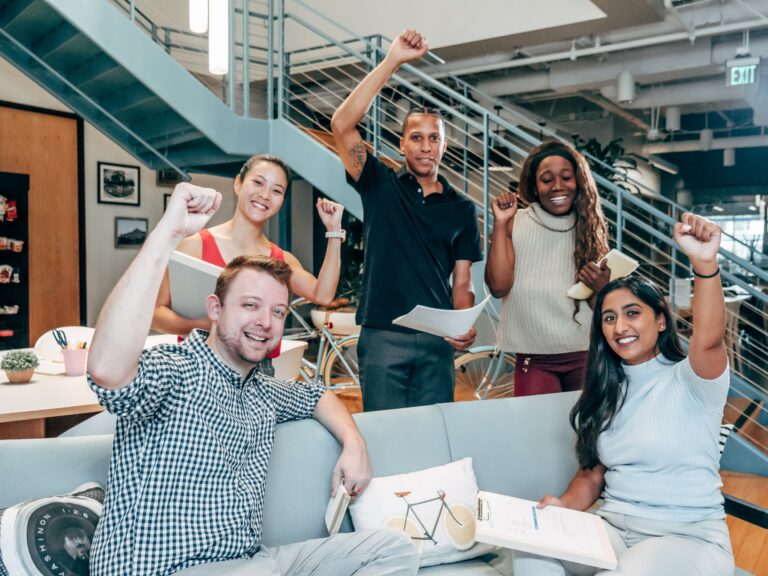Translating the digital revolution in human resources into everyday working life
ARE YOU ACTIVELY PLANNING FOR THE DIGITAL REVOLUTION IN HUMAN RESOURCES?
The digital revolution in HR is here and happening at a rapid pace. Companies are looking for new, effective and productive ways to meet the changing demands of the business world: Flexibility, round-the-clock global access, speed and accuracy. Leading companies are aware of the need to disrupt or be disrupted, so they have begun to create entirely new work environments, what we now call the digital workplace revolution. It is changing the way we think and approach daily work.

WHAT IS THE IMPACT OF BUSINESS DISRUPTION ON THE DIGITAL TRANSFORMATION OF HUMAN RESOURCES?
Let’s start with the big picture. The business world is changing faster than ever before. You’ve probably seen companies like Airbnb, Amazon, and food delivery companies Blue Apron and Home Chef transform their industries. These are popular examples of companies that have transformed their industries into something different – something more. Under Armour isn’t just selling shirts and shoes, it’s connecting 38 million people through a digital health platform. Facebook isn’t just a social network, it’s the largest media company, even if it doesn’t create content. Alibaba is not just the largest e-commerce company, but a financial services and technology company that blurs industry boundaries. Transformed companies can create new industries.
Think back five years to what your consumer experience was like. Hasn’t that changed significantly? As consumers today, we can buy just about anything from our smartphones, anytime, anywhere in the world, and have it delivered to us wherever we are, sometimes even the same day. We do important things every day through our smartphones, such as banking, remotely controlling the heating in our home, renting a vacation home somewhere in the world directly from the owner, notifying friends that we’ve checked into a restaurant, ordering products to be refilled when they run low, and the list goes on.
We have become accustomed to these digital consumer experiences in our daily lives. Can you imagine life without it? It has significantly changed and increased our engagement as consumers and completely transformed our shopping habits, as we can now shop from the comfort of our own homes. Imagine if HR had the same user-friendly, digital user experience as consumers? How would that change the way we work and the level of engagement, performance and contribution we make? Imagine if employees were as engaged at work as consumers are when shopping.
WHAT IS THE IMPACT OF DIGITAL TRANSFORMATION ON HR?
What is the connection between employee engagement and digital transformation, and how does it impact HR? The digitization of HR will change everything about the way we work, including the nature of our work, career structures, knowledge, workers, worker expectations, and the skills needed to do the job. Employees want an experience, not just a career, and they want to be engaged in their work and their company.
Culture is a key element of engagement and digital transformation. How does a company’s culture become digital? By becoming smart, modern and transparent. It uses social media, has consumer-friendly tools, and is automated, faster, and more dynamic. Most importantly, it is embedded in the daily work of employees – a way of life. The time for digital transformation is here and now.
If we take a step back and look at the evolution of HR over the last 10 years, the focus on automation has resulted in repeatable, often simpler HR transactions, with “self-service” that was faster, but often felt outdated, fragmented and disconnected. Digital transformation is not synonymous with automation. Digital transformation creates a holistic approach to the workforce that goes beyond automation to enable improved business agility, broader and more effective use of intelligent services, and leveraging and upskilling a more diverse workforce.
Business transformation is disrupting HR and technology. Investors looking for the next big technology breakthrough poured large sums of money into HR technology systems and platforms in 2016. Deal activity in the HR technology space has steadily increased in recent years and is expected to continue to rise for the foreseeable future. The significant growth in investment, much of which is in integrated HR platforms for mid-market companies, illustrates the evolution of the industry. The new work culture is being driven by the shift from the cloud to mobile devices, an explosion in analytics and artificial intelligence, and the emergence of video social recruiting and wearables in the workplace.
The long-term impact on HR is likely to be positive. The new HR mantra will be “HR is not HR.” The newly introduced tools will force HR to shift its mindset from developing and rolling out programs to a more interactive, self-service feedback loop approach with constant iterations of programs. This will increase employee buy-in and lead to a new vision of what the employee experience could and should look like. These changes will have an impact from the boardroom to frontline employees, and of course, HR.
Digital transformation creates a holistic approach that goes beyond automation, with improved business agility, intelligent services and the skills of a diverse workforce.
A key insight in any digital transformation is that technology alone is not enough to build a company culture or motivate employees. Creating meaningful work will be even more important than in the past, especially for Millennials, who will make up the majority of the workforce in the future. Employees are looking for meaning in their work and will be reluctant to use new technologies if the work itself or the content of the apps they interact with is not interesting, relevant and motivating. Employees need to know that they can help shape the future by being empowered to innovate.
WHAT WILL THE WORKFORCE OF THE FUTURE LOOK LIKE?
The workforce of the future will continue to diversify, with five different generations in the workforce, a large increase in temporary employees, and the creation of global talent pools. These changes are increasing the complexity of HR, and yet new technologies are enabling better strategic planning and management of related HR activities.
As the workforce changes, HR must continue to find new ways to deliver business results with greater simplicity, global relevance, and in ways that are engaging, not scary, for Millennials, Baby Boomers, unions, contract workers, executives – everyone.
Educating this diverse workforce in the wake of digital transformation is a must, and leaders have a vested interest in driving cultural change. Lennart Keil of SAP wrote an article in August 2016, “A Different Kind of Work,” in which he defines six digital competencies that the workforce of the future, and leaders in particular, should learn.
Use technology as an enabler: Just as smartphones have revolutionized us as people and workers, we need to recognize that new products will continue to change the way we do almost everything, both at work and at home. As virtual reality goggles, avatars and self-driving cars make their way into the workplace, accept this sooner rather than later.
Embrace disruption: The old quote “change is the only constant” is truer today than ever. Expect change. The nature of change today is different than in the past, and the pace of change is faster than ever. This leads to a greater lack of predictability, introduces us to new variables that we don’t readily understand, and leads to unclear cause-and-effect relationships as many things are less linear than in the past. Things are messier. Embrace the chaos and put it in order.
Use information technology: use social media frequently and always to get better and faster results. The Twitter campaign after the Paris attacks organized thousands of safe houses for residents within an hour, whereas it would have taken months to achieve the same results without social media. Leverage this capability.
HR must find new ways to achieve business goals with greater simplicity and global relevance that appeal to a workforce that is diverse in culture, age and skill set.
Become excellent at iteration: In the past, most HR projects were developed slowly, created at the top of the organization, and eventually “rolled out” to employees. That was the norm. The new norm is that projects are built with constant input from others and move quickly through the development phases. Good project management is still required, but iteration along the way to an acceptable launch is the new norm, rather than waiting for the 100% perfect solution and then setting a launch schedule, which can take too much time in these fast-paced times. Learn how to iterate and get used to small steps and incremental change.
Use the crowd wisely: As a leader, don’t think you have to do everything yourself. As Steve Jobs once said, “It doesn’t make sense to hire smart people and then tell them what to do; we hire smart people so they can tell us what to do. Enough said.
Go below the surface: There has always been a delicate balance between data and intuition, and that hasn’t changed and won’t change. The new challenge in the digital age is to use science, which is data, together with art, which is the human element. We will continue to be challenged to balance these two elements in our daily work and look deeper to make good decisions as we will have more and more data to analyze and still make decisions that impact employees.
These six digital competencies will help us as employees, leaders and people in the digital future. Leaders need to learn how to better use these competencies.
HOW WILL WORK TRANSFORM?
Employees’ expectations of their employers have evolved faster than companies themselves – consumer-level tools are the least that’s at stake. Leveraging new systems is critical to attracting and retaining the best talent for the future. It’s time to rethink and redesign the way we work. Innovation will impact the way we work in real time through better visibility across the organization, effective collaboration between teams and businesses, and the elimination of many manual tasks and repetitive processes.
Significant changes have already taken place in HR. Three areas of change are continuous performance management, social talent acquisition and the advent of people analytics. More major changes are on the horizon.
Continuous Performance Management:
Current: eliminating appraisals, adding continuous feedback, enabling agile goal systems with robust data, measuring team performance, redefining calibration decision methods – all in the cloud with digital capabilities.
Future: integrating pre-built development plans, online personality assessments tied to role and annual performance, resources for difficult conversations, gamification features, team management tools – all integrated into daily work.
Social Talent Acquisition:
Current: Recruiting and talent acquisition are difficult. There is still a struggle for talent – finding the best talent, employer branding and application management.
Future: rapid, comprehensive recruiting systems will focus on candidate experience with technology for relationship management. Artificial intelligence will power wearables with artificial reality to enable experiences, such as tours of offices and factories and areas related to company culture. Driverless cars will pick up candidates for interviews, avatars will support onboarding, and potential assessments will predict success in future roles until retirement.
Rise of HR analytics
Current: companies have moved their HR data warehouses to advanced analytics with reporting dashboards and predictive models.
Future: innovations in cognitive processing and natural language systems will be integrated into analytics to analyze patterns of emails, communications and performance. These patterns will predict employee behavior, align behavior and performance with follow-up, and predict potential security issues and breaches.
IS YOUR COMPANY PREPARED?
Many employees feel it is very important to work for a digital company or digital leader. By integrating culture, engagement and the technologies employees use, the digital workplace breaks down communication barriers and transforms the employee experience by driving efficiency and innovation. In essence, the new digital experience drives change by bringing new technologies into daily work.
Companies that have digitally transformed their HR departments are more successful and more likely to have strong financial performance, invest in diversity at all levels, and have mature succession strategies. The next wave of technology will drive productivity, and this trend is too significant for HR leaders to ignore.
HR must embrace the digital revolution, lead the HR transformation, and engage employees to reap the benefits. Go through the icehrm.com as the best digital HR solutions in this transforming digital era.








